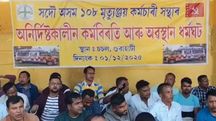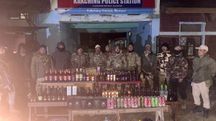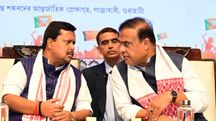
In the shadows of Diwali: Gharbhanga's fight for light in darkness
In Gharbhanga Reserve Forest, villagers face a dark Diwali without electricity.

Deep in the serene Gharbhanga Reserve Forest, an eerie calm reigns, far from the humid bustle of Guwahati. While the rest of the city gears up for the vibrant festivities of Diwali, the "festival of lights," these remote villagers find themselves in the grips of perpetual darkness.
For the families who call Gharbhanga home, electricity - a basic necessity that urban dwellers take for granted, feeling claustrophobic at the mere thought of losing power for a few hours - remains elusive, year after year.
India Today NE set out on a journey to witness this stark contrast firsthand. After navigating through heavy traffic and relying on vague directions, we reached the forest checkpoint, where wary officials warned us about the wild elephants and tigers that roamed the reserve.
Undeterred, we pressed on, driving deeper into the lush greenery until we finally spotted a woman washing clothes by a stream.
This was Sunati Fangshu, a 50-year-old mother of two who had lived in the area for generations.

Welcoming us into her modest wooden home, Sunati shared, "Diwali is all about lights, but for us, it's more about darkness. We light whatever lamps we can, but it's not the same as having electric lights to brighten up our homes."
Her son, Rinku, a shy 8th grader, pleaded, "Mama (as the people of Assam dearly call CM Himanta Biswa Sarma), please can you get us electricity? We really need it, especially during the festival season."

His earnest request struck a chord, a poignant reminder of the stark inequalities that still exist, even as the modern world marches on.
Sunati explained the daily challenges: "We go to the Meghalaya (neighbouring state) side of the forest to charge our phones. We use the stream water for everything - washing, cooking, drinking. It's tough, but we've learned to manage."

Local officials acknowledged the issue but cited environmental regulations as a barrier to providing basic infrastructure.
As the rest of Guwahati lights up with "diyas" and fairy lights, the families of Gharbhanga must find solace in the warm glow of kerosene lamps and the strength of their close-knit community. Their Diwali celebrations, while lacking the dazzle of the urban festivities, represent a triumph of the human spirit over adversity.
Yet, one can't help but wonder - is this remote community being ignored, its plight overshadowed by the modern conveniences that most take for granted? For the Gharbhanga families, electricity remains an elusive dream, even as the rest of the city revels in the splendour of the "festival of lights."
Copyright©2025 Living Media India Limited. For reprint rights: Syndications Today









